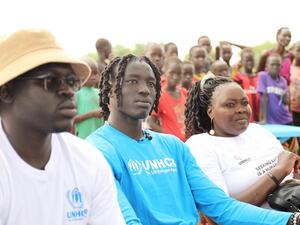UNHCR assisting thousands displaced by security operation in Pakistan
UNHCR assisting thousands displaced by security operation in Pakistan

Families who have fled their homes in Pakistan's Federally Administered Tribal Areas register with UNHCR at the Jalozai camp near Peshawar.
PESHAWAR, Pakistan, March 30 (UNHCR) - UNHCR, together with other UN agencies, is assisting tens of thousands of people who have fled fighting in parts of Pakistan's Federally Administered Tribal Areas (FATA), which border Afghanistan.
An estimated 101,160 people, mainly women and children, have been displaced since government troops began security operations on January 20 against militant groups in the Khyber Agency region.
A recent increase in the intensity of the fighting has seen a rise in the number of families who are leaving the area. Starting on March 17, a new wave of internally displaced people has been approaching the Jalozai camp, where UNHCR is registering them and providing them with basic humanitarian supplies.
A partner UN agency, the World Food Programme, is providing food aid. Jalozai is located near the western city of Peshawar in Khyber Pakhtunkhwa province, formally known the North-West Frontier Province.
On Wednesday, UNHCR registered 1,721 families or 7,054 individuals. As with earlier arrivals, the vast majority opted to live outside the camp with host families. Just 515 of the more than 7,000 people registered chose to live in the Jalozai camp. All of those registered were provided with a package of relief supplies such as blankets, soap and sleeping mats, a UNICEF hygiene kit and an initial one-month food supply.
UNHCR Representative in Pakistan Neil Wright visited Jalozai on Friday and met with those who had recently arrived. Among them was Mir Afzal, who had come to Peshawar with his family a day earlier. Afzal said military officials had recently made an announcement at his village mosque that residents should temporarily evacuate the area. "Within our communities," he said, "every one knows what the situation is and where we should go for help."
Since this latest movement of displaced families began earlier this month, UNHCR has registered 45,786 people from the Khyber Agency. Almost 15,700 have moved into the Jalozai camp with the rest living with friends and relatives. The number of people living in Jalozai now stands at 62,818 people, of which 47,134 were living in the camp before March 17.
After visiting newly established settlements in the camp, Wright said he was impressed by the initial response. "In less than two weeks, thousands of tents have been erected, food distributed and truckloads of humanitarian aid has been distributed," he said. "Government, UN and non-governmental agencies are working together to help those who have had to leave their homes and possessions behind."
New arrivals say they left their homes because of the proximity of fighting and due to instructions by the authorities to evacuate the area. Systems are in place to identify vulnerable families and individuals and to identify special needs. Families headed by a lone female, for instance, are prioritized in the process of registration, tent allocation and the provision of humanitarian assistance.
On average, UNHCR field staff have been registering nearly 2,000 families each day since the March 17 surge in arrivals.
By Tim Irwin in Peshawar, Pakistan








